The Right to Privacy in Direct Marketing within South African Law
VerifiedAdded on 2022/08/12
|12
|2937
|21
Report
AI Summary
This report examines the right to privacy in direct marketing within the context of South African law, with a primary focus on the Protection of Personal Information Act (POPI). The paper discusses the legal and regulatory framework, comparing it with international standards and emphasizing its relevance to consumer safety in the insurance sector. It delves into the definition of personal data, the specific privacy laws in South Africa, and the constitutional basis for privacy protection. The report analyzes the implications of the POPI Act, including its positive impacts on data protection, transparency, and consumer rights, while also acknowledging the negative aspects such as increased operational costs and compliance challenges for businesses. The study explores the Act's impact on the insurance industry, particularly in the context of direct marketing and data collection practices like cold calling, and the growing importance of cyber security insurance. The report concludes by highlighting the ongoing efforts of South African companies to comply with the POPI Act to ensure the secure handling of customer information.
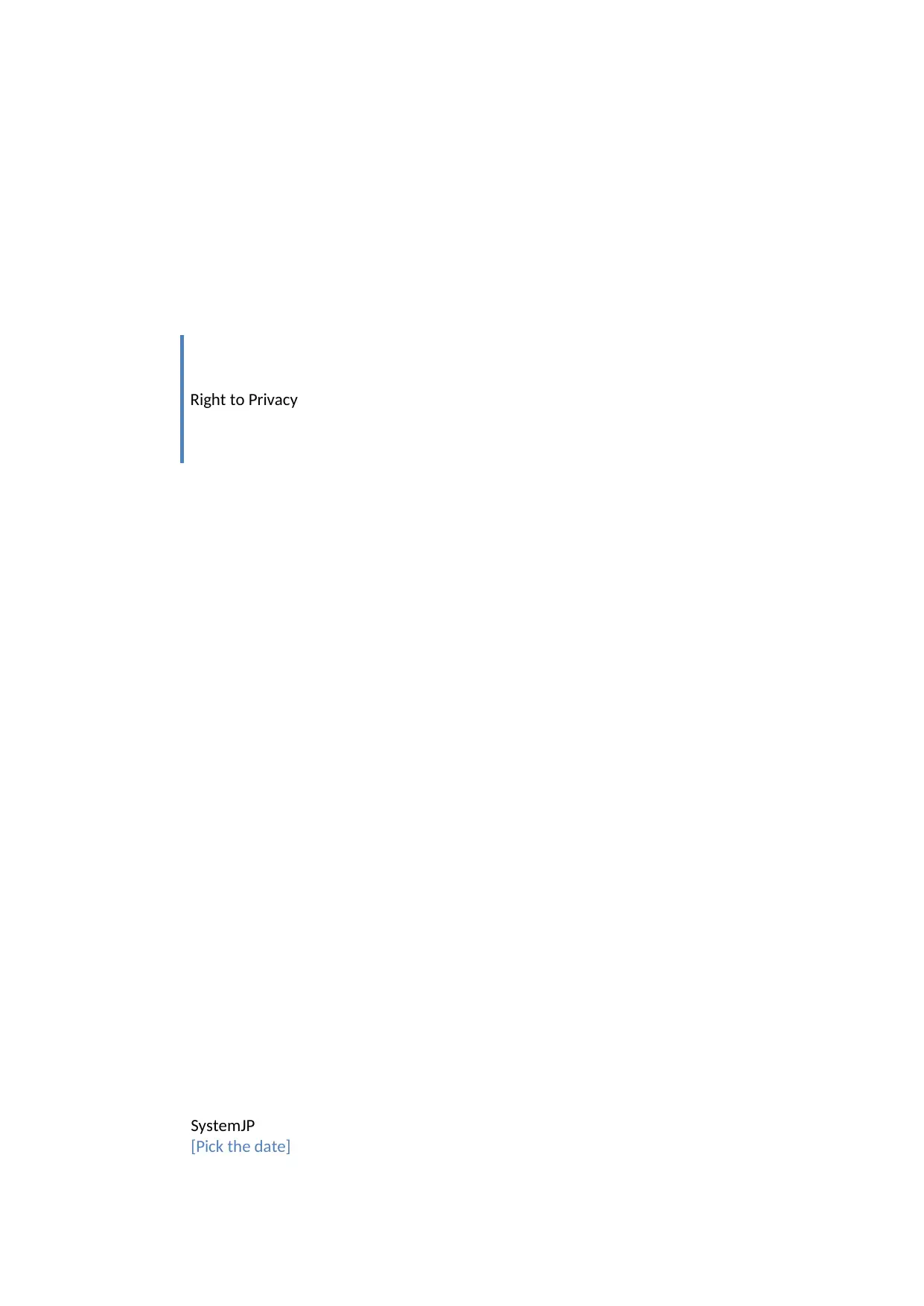
Right to Privacy
SystemJP
[Pick the date]
SystemJP
[Pick the date]
Paraphrase This Document
Need a fresh take? Get an instant paraphrase of this document with our AI Paraphraser
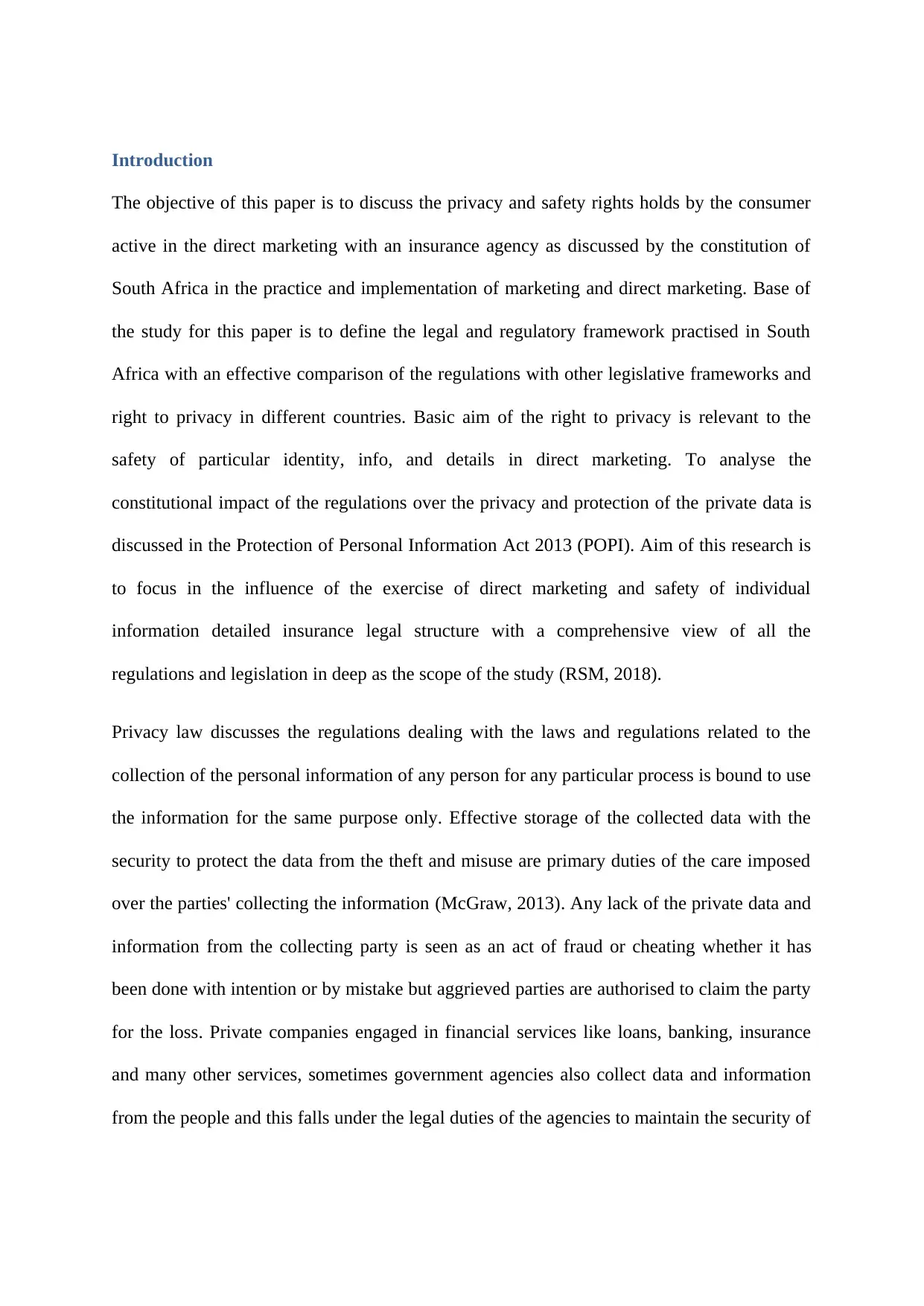
Introduction
The objective of this paper is to discuss the privacy and safety rights holds by the consumer
active in the direct marketing with an insurance agency as discussed by the constitution of
South Africa in the practice and implementation of marketing and direct marketing. Base of
the study for this paper is to define the legal and regulatory framework practised in South
Africa with an effective comparison of the regulations with other legislative frameworks and
right to privacy in different countries. Basic aim of the right to privacy is relevant to the
safety of particular identity, info, and details in direct marketing. To analyse the
constitutional impact of the regulations over the privacy and protection of the private data is
discussed in the Protection of Personal Information Act 2013 (POPI). Aim of this research is
to focus in the influence of the exercise of direct marketing and safety of individual
information detailed insurance legal structure with a comprehensive view of all the
regulations and legislation in deep as the scope of the study (RSM, 2018).
Privacy law discusses the regulations dealing with the laws and regulations related to the
collection of the personal information of any person for any particular process is bound to use
the information for the same purpose only. Effective storage of the collected data with the
security to protect the data from the theft and misuse are primary duties of the care imposed
over the parties' collecting the information (McGraw, 2013). Any lack of the private data and
information from the collecting party is seen as an act of fraud or cheating whether it has
been done with intention or by mistake but aggrieved parties are authorised to claim the party
for the loss. Private companies engaged in financial services like loans, banking, insurance
and many other services, sometimes government agencies also collect data and information
from the people and this falls under the legal duties of the agencies to maintain the security of
The objective of this paper is to discuss the privacy and safety rights holds by the consumer
active in the direct marketing with an insurance agency as discussed by the constitution of
South Africa in the practice and implementation of marketing and direct marketing. Base of
the study for this paper is to define the legal and regulatory framework practised in South
Africa with an effective comparison of the regulations with other legislative frameworks and
right to privacy in different countries. Basic aim of the right to privacy is relevant to the
safety of particular identity, info, and details in direct marketing. To analyse the
constitutional impact of the regulations over the privacy and protection of the private data is
discussed in the Protection of Personal Information Act 2013 (POPI). Aim of this research is
to focus in the influence of the exercise of direct marketing and safety of individual
information detailed insurance legal structure with a comprehensive view of all the
regulations and legislation in deep as the scope of the study (RSM, 2018).
Privacy law discusses the regulations dealing with the laws and regulations related to the
collection of the personal information of any person for any particular process is bound to use
the information for the same purpose only. Effective storage of the collected data with the
security to protect the data from the theft and misuse are primary duties of the care imposed
over the parties' collecting the information (McGraw, 2013). Any lack of the private data and
information from the collecting party is seen as an act of fraud or cheating whether it has
been done with intention or by mistake but aggrieved parties are authorised to claim the party
for the loss. Private companies engaged in financial services like loans, banking, insurance
and many other services, sometimes government agencies also collect data and information
from the people and this falls under the legal duties of the agencies to maintain the security of
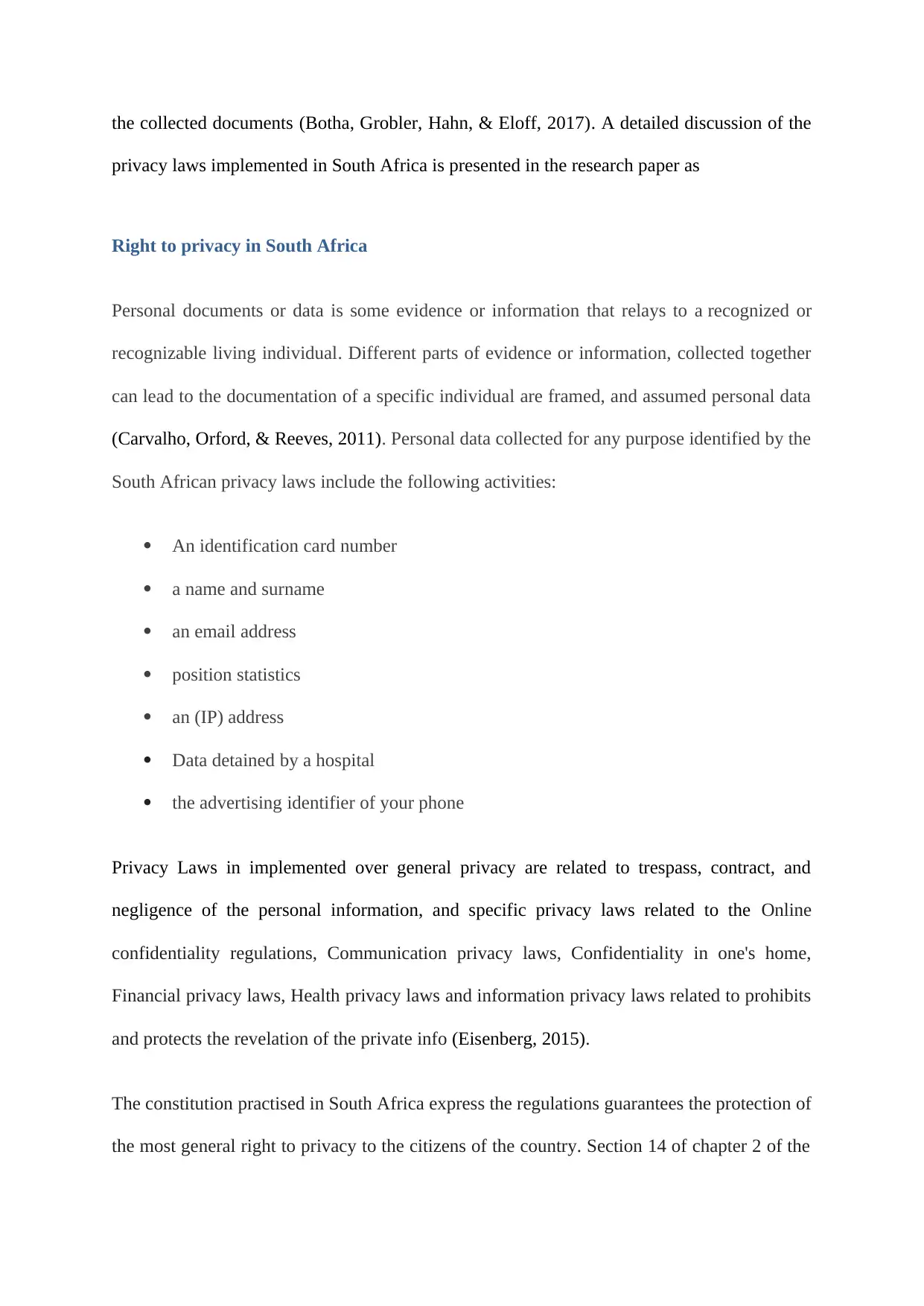
the collected documents (Botha, Grobler, Hahn, & Eloff, 2017). A detailed discussion of the
privacy laws implemented in South Africa is presented in the research paper as
Right to privacy in South Africa
Personal documents or data is some evidence or information that relays to a recognized or
recognizable living individual. Different parts of evidence or information, collected together
can lead to the documentation of a specific individual are framed, and assumed personal data
(Carvalho, Orford, & Reeves, 2011). Personal data collected for any purpose identified by the
South African privacy laws include the following activities:
An identification card number
a name and surname
an email address
position statistics
an (IP) address
Data detained by a hospital
the advertising identifier of your phone
Privacy Laws in implemented over general privacy are related to trespass, contract, and
negligence of the personal information, and specific privacy laws related to the Online
confidentiality regulations, Communication privacy laws, Confidentiality in one's home,
Financial privacy laws, Health privacy laws and information privacy laws related to prohibits
and protects the revelation of the private info (Eisenberg, 2015).
The constitution practised in South Africa express the regulations guarantees the protection of
the most general right to privacy to the citizens of the country. Section 14 of chapter 2 of the
privacy laws implemented in South Africa is presented in the research paper as
Right to privacy in South Africa
Personal documents or data is some evidence or information that relays to a recognized or
recognizable living individual. Different parts of evidence or information, collected together
can lead to the documentation of a specific individual are framed, and assumed personal data
(Carvalho, Orford, & Reeves, 2011). Personal data collected for any purpose identified by the
South African privacy laws include the following activities:
An identification card number
a name and surname
an email address
position statistics
an (IP) address
Data detained by a hospital
the advertising identifier of your phone
Privacy Laws in implemented over general privacy are related to trespass, contract, and
negligence of the personal information, and specific privacy laws related to the Online
confidentiality regulations, Communication privacy laws, Confidentiality in one's home,
Financial privacy laws, Health privacy laws and information privacy laws related to prohibits
and protects the revelation of the private info (Eisenberg, 2015).
The constitution practised in South Africa express the regulations guarantees the protection of
the most general right to privacy to the citizens of the country. Section 14 of chapter 2 of the
⊘ This is a preview!⊘
Do you want full access?
Subscribe today to unlock all pages.

Trusted by 1+ million students worldwide
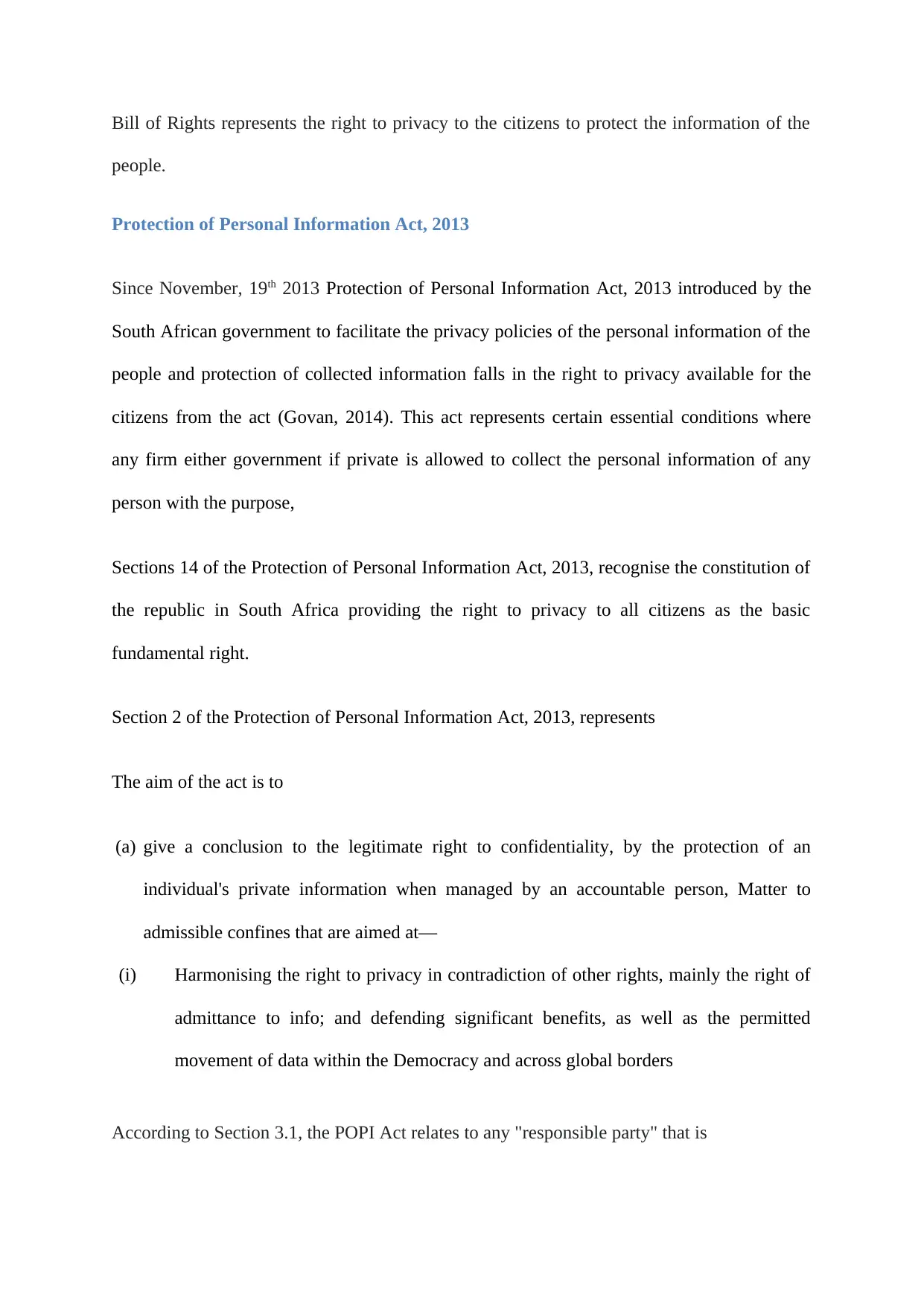
Bill of Rights represents the right to privacy to the citizens to protect the information of the
people.
Protection of Personal Information Act, 2013
Since November, 19th 2013 Protection of Personal Information Act, 2013 introduced by the
South African government to facilitate the privacy policies of the personal information of the
people and protection of collected information falls in the right to privacy available for the
citizens from the act (Govan, 2014). This act represents certain essential conditions where
any firm either government if private is allowed to collect the personal information of any
person with the purpose,
Sections 14 of the Protection of Personal Information Act, 2013, recognise the constitution of
the republic in South Africa providing the right to privacy to all citizens as the basic
fundamental right.
Section 2 of the Protection of Personal Information Act, 2013, represents
The aim of the act is to
(a) give a conclusion to the legitimate right to confidentiality, by the protection of an
individual's private information when managed by an accountable person, Matter to
admissible confines that are aimed at—
(i) Harmonising the right to privacy in contradiction of other rights, mainly the right of
admittance to info; and defending significant benefits, as well as the permitted
movement of data within the Democracy and across global borders
According to Section 3.1, the POPI Act relates to any "responsible party" that is
people.
Protection of Personal Information Act, 2013
Since November, 19th 2013 Protection of Personal Information Act, 2013 introduced by the
South African government to facilitate the privacy policies of the personal information of the
people and protection of collected information falls in the right to privacy available for the
citizens from the act (Govan, 2014). This act represents certain essential conditions where
any firm either government if private is allowed to collect the personal information of any
person with the purpose,
Sections 14 of the Protection of Personal Information Act, 2013, recognise the constitution of
the republic in South Africa providing the right to privacy to all citizens as the basic
fundamental right.
Section 2 of the Protection of Personal Information Act, 2013, represents
The aim of the act is to
(a) give a conclusion to the legitimate right to confidentiality, by the protection of an
individual's private information when managed by an accountable person, Matter to
admissible confines that are aimed at—
(i) Harmonising the right to privacy in contradiction of other rights, mainly the right of
admittance to info; and defending significant benefits, as well as the permitted
movement of data within the Democracy and across global borders
According to Section 3.1, the POPI Act relates to any "responsible party" that is
Paraphrase This Document
Need a fresh take? Get an instant paraphrase of this document with our AI Paraphraser
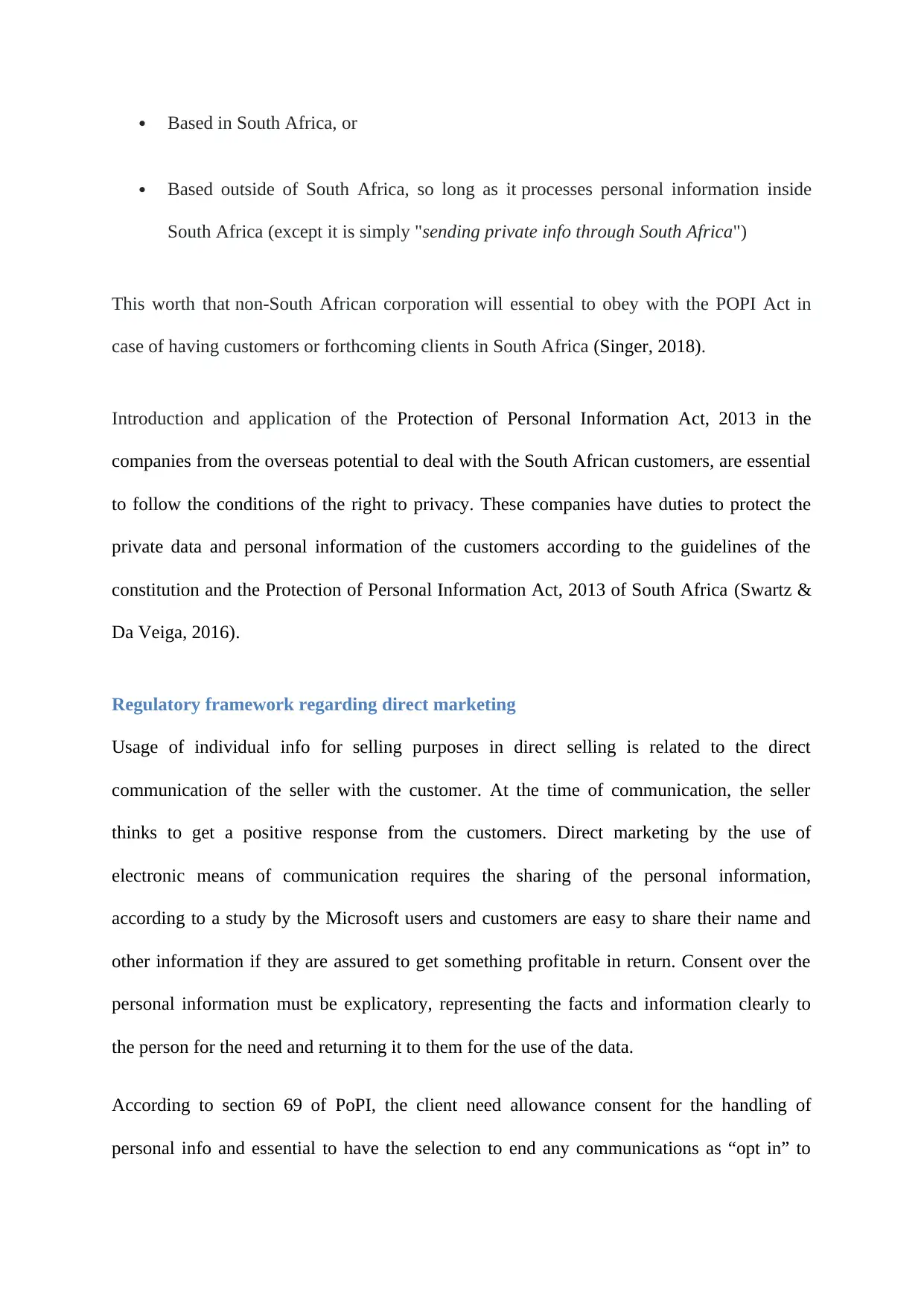
Based in South Africa, or
Based outside of South Africa, so long as it processes personal information inside
South Africa (except it is simply "sending private info through South Africa")
This worth that non-South African corporation will essential to obey with the POPI Act in
case of having customers or forthcoming clients in South Africa (Singer, 2018).
Introduction and application of the Protection of Personal Information Act, 2013 in the
companies from the overseas potential to deal with the South African customers, are essential
to follow the conditions of the right to privacy. These companies have duties to protect the
private data and personal information of the customers according to the guidelines of the
constitution and the Protection of Personal Information Act, 2013 of South Africa (Swartz &
Da Veiga, 2016).
Regulatory framework regarding direct marketing
Usage of individual info for selling purposes in direct selling is related to the direct
communication of the seller with the customer. At the time of communication, the seller
thinks to get a positive response from the customers. Direct marketing by the use of
electronic means of communication requires the sharing of the personal information,
according to a study by the Microsoft users and customers are easy to share their name and
other information if they are assured to get something profitable in return. Consent over the
personal information must be explicatory, representing the facts and information clearly to
the person for the need and returning it to them for the use of the data.
According to section 69 of PoPI, the client need allowance consent for the handling of
personal info and essential to have the selection to end any communications as “opt in” to
Based outside of South Africa, so long as it processes personal information inside
South Africa (except it is simply "sending private info through South Africa")
This worth that non-South African corporation will essential to obey with the POPI Act in
case of having customers or forthcoming clients in South Africa (Singer, 2018).
Introduction and application of the Protection of Personal Information Act, 2013 in the
companies from the overseas potential to deal with the South African customers, are essential
to follow the conditions of the right to privacy. These companies have duties to protect the
private data and personal information of the customers according to the guidelines of the
constitution and the Protection of Personal Information Act, 2013 of South Africa (Swartz &
Da Veiga, 2016).
Regulatory framework regarding direct marketing
Usage of individual info for selling purposes in direct selling is related to the direct
communication of the seller with the customer. At the time of communication, the seller
thinks to get a positive response from the customers. Direct marketing by the use of
electronic means of communication requires the sharing of the personal information,
according to a study by the Microsoft users and customers are easy to share their name and
other information if they are assured to get something profitable in return. Consent over the
personal information must be explicatory, representing the facts and information clearly to
the person for the need and returning it to them for the use of the data.
According to section 69 of PoPI, the client need allowance consent for the handling of
personal info and essential to have the selection to end any communications as “opt in” to
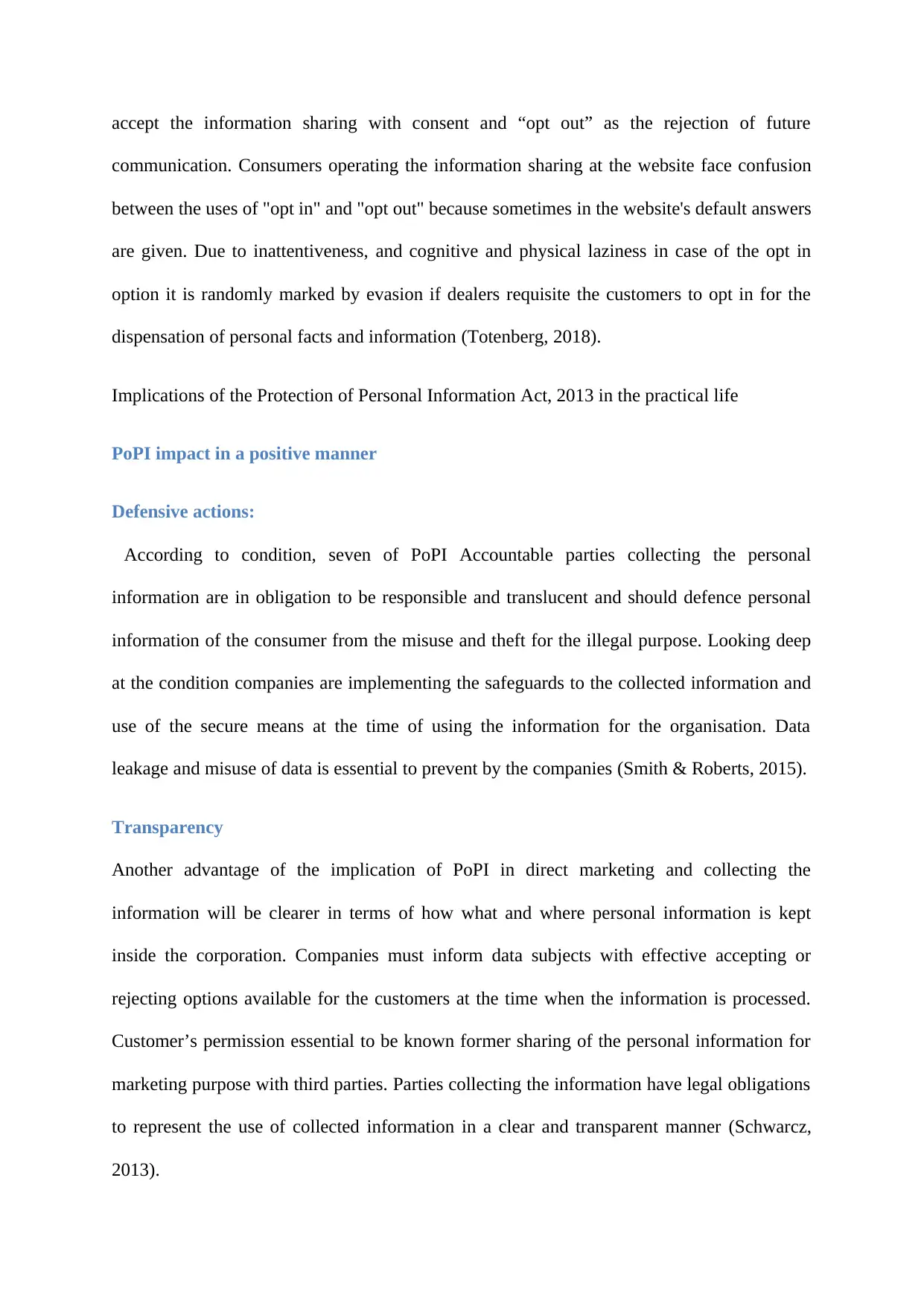
accept the information sharing with consent and “opt out” as the rejection of future
communication. Consumers operating the information sharing at the website face confusion
between the uses of "opt in" and "opt out" because sometimes in the website's default answers
are given. Due to inattentiveness, and cognitive and physical laziness in case of the opt in
option it is randomly marked by evasion if dealers requisite the customers to opt in for the
dispensation of personal facts and information (Totenberg, 2018).
Implications of the Protection of Personal Information Act, 2013 in the practical life
PoPI impact in a positive manner
Defensive actions:
According to condition, seven of PoPI Accountable parties collecting the personal
information are in obligation to be responsible and translucent and should defence personal
information of the consumer from the misuse and theft for the illegal purpose. Looking deep
at the condition companies are implementing the safeguards to the collected information and
use of the secure means at the time of using the information for the organisation. Data
leakage and misuse of data is essential to prevent by the companies (Smith & Roberts, 2015).
Transparency
Another advantage of the implication of PoPI in direct marketing and collecting the
information will be clearer in terms of how what and where personal information is kept
inside the corporation. Companies must inform data subjects with effective accepting or
rejecting options available for the customers at the time when the information is processed.
Customer’s permission essential to be known former sharing of the personal information for
marketing purpose with third parties. Parties collecting the information have legal obligations
to represent the use of collected information in a clear and transparent manner (Schwarcz,
2013).
communication. Consumers operating the information sharing at the website face confusion
between the uses of "opt in" and "opt out" because sometimes in the website's default answers
are given. Due to inattentiveness, and cognitive and physical laziness in case of the opt in
option it is randomly marked by evasion if dealers requisite the customers to opt in for the
dispensation of personal facts and information (Totenberg, 2018).
Implications of the Protection of Personal Information Act, 2013 in the practical life
PoPI impact in a positive manner
Defensive actions:
According to condition, seven of PoPI Accountable parties collecting the personal
information are in obligation to be responsible and translucent and should defence personal
information of the consumer from the misuse and theft for the illegal purpose. Looking deep
at the condition companies are implementing the safeguards to the collected information and
use of the secure means at the time of using the information for the organisation. Data
leakage and misuse of data is essential to prevent by the companies (Smith & Roberts, 2015).
Transparency
Another advantage of the implication of PoPI in direct marketing and collecting the
information will be clearer in terms of how what and where personal information is kept
inside the corporation. Companies must inform data subjects with effective accepting or
rejecting options available for the customers at the time when the information is processed.
Customer’s permission essential to be known former sharing of the personal information for
marketing purpose with third parties. Parties collecting the information have legal obligations
to represent the use of collected information in a clear and transparent manner (Schwarcz,
2013).
⊘ This is a preview!⊘
Do you want full access?
Subscribe today to unlock all pages.

Trusted by 1+ million students worldwide
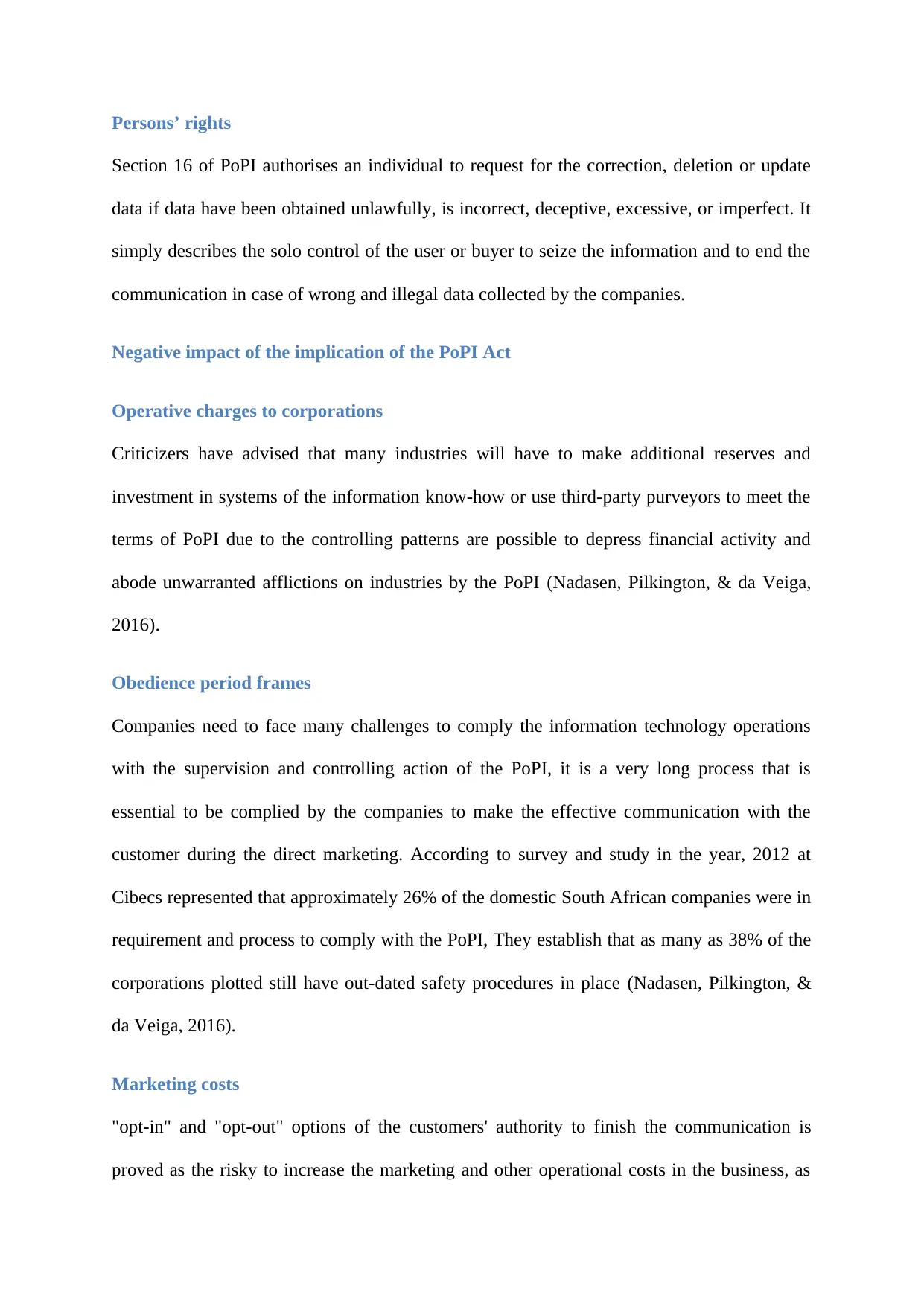
Persons’ rights
Section 16 of PoPI authorises an individual to request for the correction, deletion or update
data if data have been obtained unlawfully, is incorrect, deceptive, excessive, or imperfect. It
simply describes the solo control of the user or buyer to seize the information and to end the
communication in case of wrong and illegal data collected by the companies.
Negative impact of the implication of the PoPI Act
Operative charges to corporations
Criticizers have advised that many industries will have to make additional reserves and
investment in systems of the information know-how or use third-party purveyors to meet the
terms of PoPI due to the controlling patterns are possible to depress financial activity and
abode unwarranted afflictions on industries by the PoPI (Nadasen, Pilkington, & da Veiga,
2016).
Obedience period frames
Companies need to face many challenges to comply the information technology operations
with the supervision and controlling action of the PoPI, it is a very long process that is
essential to be complied by the companies to make the effective communication with the
customer during the direct marketing. According to survey and study in the year, 2012 at
Cibecs represented that approximately 26% of the domestic South African companies were in
requirement and process to comply with the PoPI, They establish that as many as 38% of the
corporations plotted still have out-dated safety procedures in place (Nadasen, Pilkington, &
da Veiga, 2016).
Marketing costs
"opt-in" and "opt-out" options of the customers' authority to finish the communication is
proved as the risky to increase the marketing and other operational costs in the business, as
Section 16 of PoPI authorises an individual to request for the correction, deletion or update
data if data have been obtained unlawfully, is incorrect, deceptive, excessive, or imperfect. It
simply describes the solo control of the user or buyer to seize the information and to end the
communication in case of wrong and illegal data collected by the companies.
Negative impact of the implication of the PoPI Act
Operative charges to corporations
Criticizers have advised that many industries will have to make additional reserves and
investment in systems of the information know-how or use third-party purveyors to meet the
terms of PoPI due to the controlling patterns are possible to depress financial activity and
abode unwarranted afflictions on industries by the PoPI (Nadasen, Pilkington, & da Veiga,
2016).
Obedience period frames
Companies need to face many challenges to comply the information technology operations
with the supervision and controlling action of the PoPI, it is a very long process that is
essential to be complied by the companies to make the effective communication with the
customer during the direct marketing. According to survey and study in the year, 2012 at
Cibecs represented that approximately 26% of the domestic South African companies were in
requirement and process to comply with the PoPI, They establish that as many as 38% of the
corporations plotted still have out-dated safety procedures in place (Nadasen, Pilkington, &
da Veiga, 2016).
Marketing costs
"opt-in" and "opt-out" options of the customers' authority to finish the communication is
proved as the risky to increase the marketing and other operational costs in the business, as
Paraphrase This Document
Need a fresh take? Get an instant paraphrase of this document with our AI Paraphraser
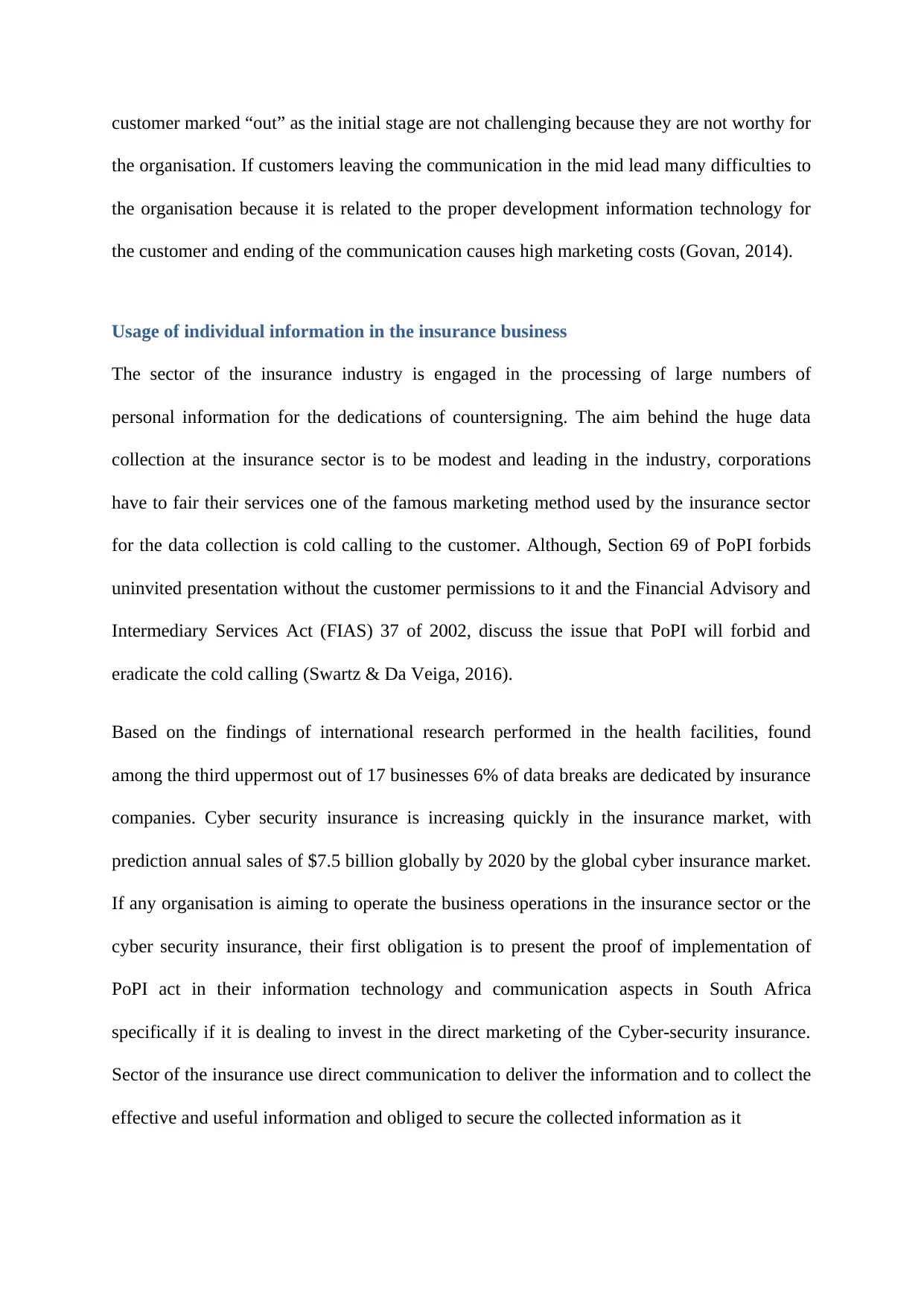
customer marked “out” as the initial stage are not challenging because they are not worthy for
the organisation. If customers leaving the communication in the mid lead many difficulties to
the organisation because it is related to the proper development information technology for
the customer and ending of the communication causes high marketing costs (Govan, 2014).
Usage of individual information in the insurance business
The sector of the insurance industry is engaged in the processing of large numbers of
personal information for the dedications of countersigning. The aim behind the huge data
collection at the insurance sector is to be modest and leading in the industry, corporations
have to fair their services one of the famous marketing method used by the insurance sector
for the data collection is cold calling to the customer. Although, Section 69 of PoPI forbids
uninvited presentation without the customer permissions to it and the Financial Advisory and
Intermediary Services Act (FIAS) 37 of 2002, discuss the issue that PoPI will forbid and
eradicate the cold calling (Swartz & Da Veiga, 2016).
Based on the findings of international research performed in the health facilities, found
among the third uppermost out of 17 businesses 6% of data breaks are dedicated by insurance
companies. Cyber security insurance is increasing quickly in the insurance market, with
prediction annual sales of $7.5 billion globally by 2020 by the global cyber insurance market.
If any organisation is aiming to operate the business operations in the insurance sector or the
cyber security insurance, their first obligation is to present the proof of implementation of
PoPI act in their information technology and communication aspects in South Africa
specifically if it is dealing to invest in the direct marketing of the Cyber-security insurance.
Sector of the insurance use direct communication to deliver the information and to collect the
effective and useful information and obliged to secure the collected information as it
the organisation. If customers leaving the communication in the mid lead many difficulties to
the organisation because it is related to the proper development information technology for
the customer and ending of the communication causes high marketing costs (Govan, 2014).
Usage of individual information in the insurance business
The sector of the insurance industry is engaged in the processing of large numbers of
personal information for the dedications of countersigning. The aim behind the huge data
collection at the insurance sector is to be modest and leading in the industry, corporations
have to fair their services one of the famous marketing method used by the insurance sector
for the data collection is cold calling to the customer. Although, Section 69 of PoPI forbids
uninvited presentation without the customer permissions to it and the Financial Advisory and
Intermediary Services Act (FIAS) 37 of 2002, discuss the issue that PoPI will forbid and
eradicate the cold calling (Swartz & Da Veiga, 2016).
Based on the findings of international research performed in the health facilities, found
among the third uppermost out of 17 businesses 6% of data breaks are dedicated by insurance
companies. Cyber security insurance is increasing quickly in the insurance market, with
prediction annual sales of $7.5 billion globally by 2020 by the global cyber insurance market.
If any organisation is aiming to operate the business operations in the insurance sector or the
cyber security insurance, their first obligation is to present the proof of implementation of
PoPI act in their information technology and communication aspects in South Africa
specifically if it is dealing to invest in the direct marketing of the Cyber-security insurance.
Sector of the insurance use direct communication to deliver the information and to collect the
effective and useful information and obliged to secure the collected information as it
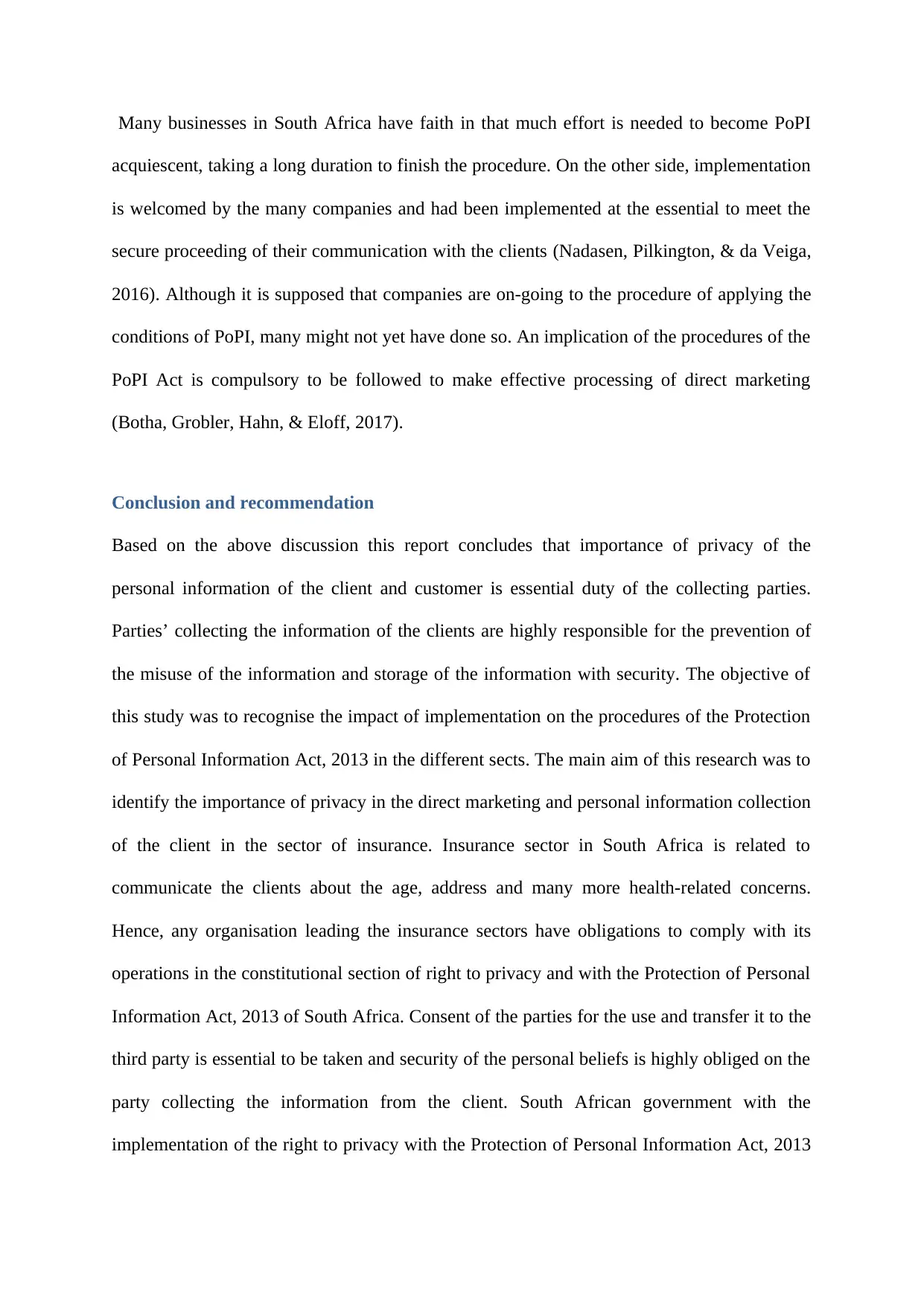
Many businesses in South Africa have faith in that much effort is needed to become PoPI
acquiescent, taking a long duration to finish the procedure. On the other side, implementation
is welcomed by the many companies and had been implemented at the essential to meet the
secure proceeding of their communication with the clients (Nadasen, Pilkington, & da Veiga,
2016). Although it is supposed that companies are on-going to the procedure of applying the
conditions of PoPI, many might not yet have done so. An implication of the procedures of the
PoPI Act is compulsory to be followed to make effective processing of direct marketing
(Botha, Grobler, Hahn, & Eloff, 2017).
Conclusion and recommendation
Based on the above discussion this report concludes that importance of privacy of the
personal information of the client and customer is essential duty of the collecting parties.
Parties’ collecting the information of the clients are highly responsible for the prevention of
the misuse of the information and storage of the information with security. The objective of
this study was to recognise the impact of implementation on the procedures of the Protection
of Personal Information Act, 2013 in the different sects. The main aim of this research was to
identify the importance of privacy in the direct marketing and personal information collection
of the client in the sector of insurance. Insurance sector in South Africa is related to
communicate the clients about the age, address and many more health-related concerns.
Hence, any organisation leading the insurance sectors have obligations to comply with its
operations in the constitutional section of right to privacy and with the Protection of Personal
Information Act, 2013 of South Africa. Consent of the parties for the use and transfer it to the
third party is essential to be taken and security of the personal beliefs is highly obliged on the
party collecting the information from the client. South African government with the
implementation of the right to privacy with the Protection of Personal Information Act, 2013
acquiescent, taking a long duration to finish the procedure. On the other side, implementation
is welcomed by the many companies and had been implemented at the essential to meet the
secure proceeding of their communication with the clients (Nadasen, Pilkington, & da Veiga,
2016). Although it is supposed that companies are on-going to the procedure of applying the
conditions of PoPI, many might not yet have done so. An implication of the procedures of the
PoPI Act is compulsory to be followed to make effective processing of direct marketing
(Botha, Grobler, Hahn, & Eloff, 2017).
Conclusion and recommendation
Based on the above discussion this report concludes that importance of privacy of the
personal information of the client and customer is essential duty of the collecting parties.
Parties’ collecting the information of the clients are highly responsible for the prevention of
the misuse of the information and storage of the information with security. The objective of
this study was to recognise the impact of implementation on the procedures of the Protection
of Personal Information Act, 2013 in the different sects. The main aim of this research was to
identify the importance of privacy in the direct marketing and personal information collection
of the client in the sector of insurance. Insurance sector in South Africa is related to
communicate the clients about the age, address and many more health-related concerns.
Hence, any organisation leading the insurance sectors have obligations to comply with its
operations in the constitutional section of right to privacy and with the Protection of Personal
Information Act, 2013 of South Africa. Consent of the parties for the use and transfer it to the
third party is essential to be taken and security of the personal beliefs is highly obliged on the
party collecting the information from the client. South African government with the
implementation of the right to privacy with the Protection of Personal Information Act, 2013
⊘ This is a preview!⊘
Do you want full access?
Subscribe today to unlock all pages.

Trusted by 1+ million students worldwide
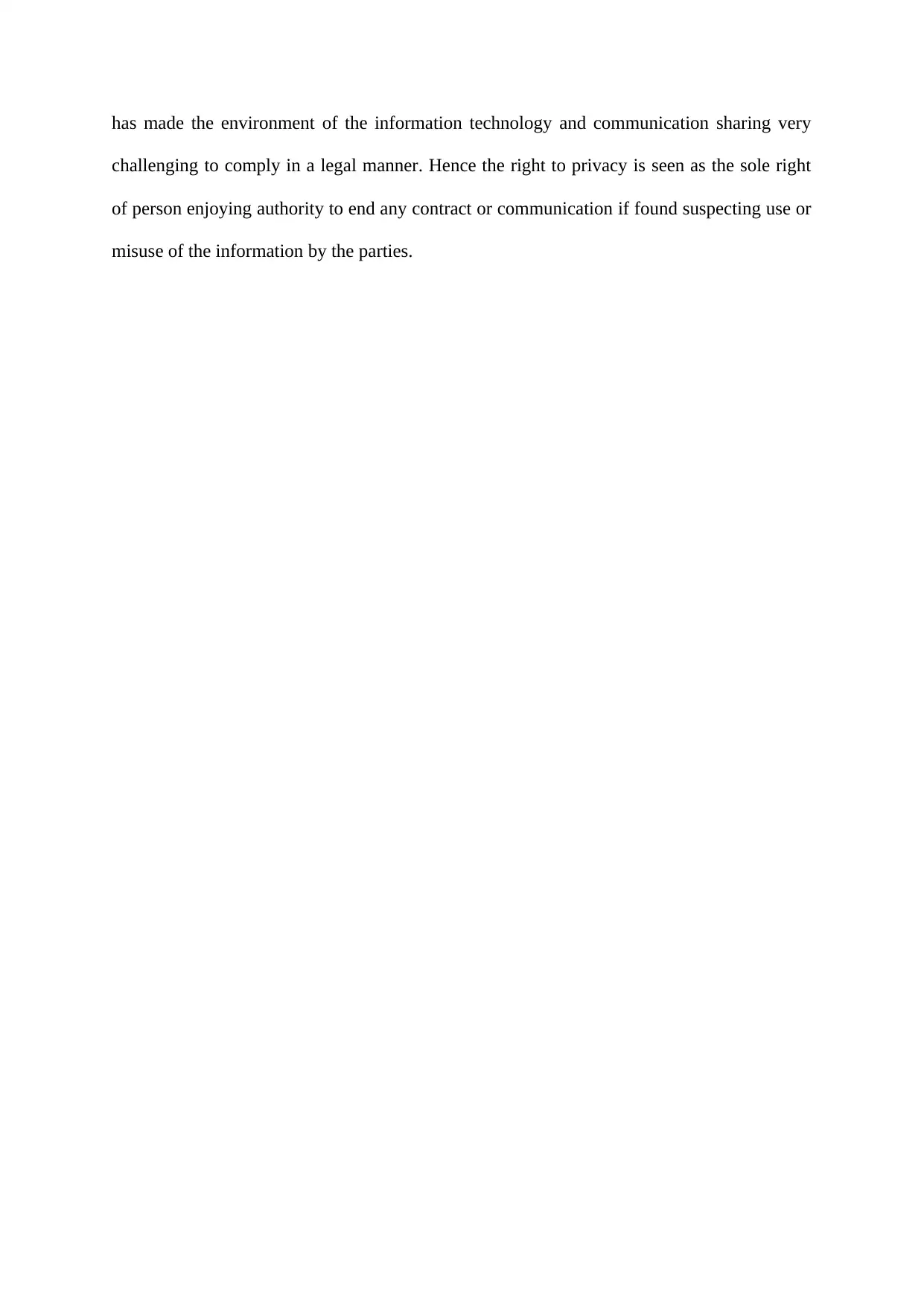
has made the environment of the information technology and communication sharing very
challenging to comply in a legal manner. Hence the right to privacy is seen as the sole right
of person enjoying authority to end any contract or communication if found suspecting use or
misuse of the information by the parties.
challenging to comply in a legal manner. Hence the right to privacy is seen as the sole right
of person enjoying authority to end any contract or communication if found suspecting use or
misuse of the information by the parties.
Paraphrase This Document
Need a fresh take? Get an instant paraphrase of this document with our AI Paraphraser
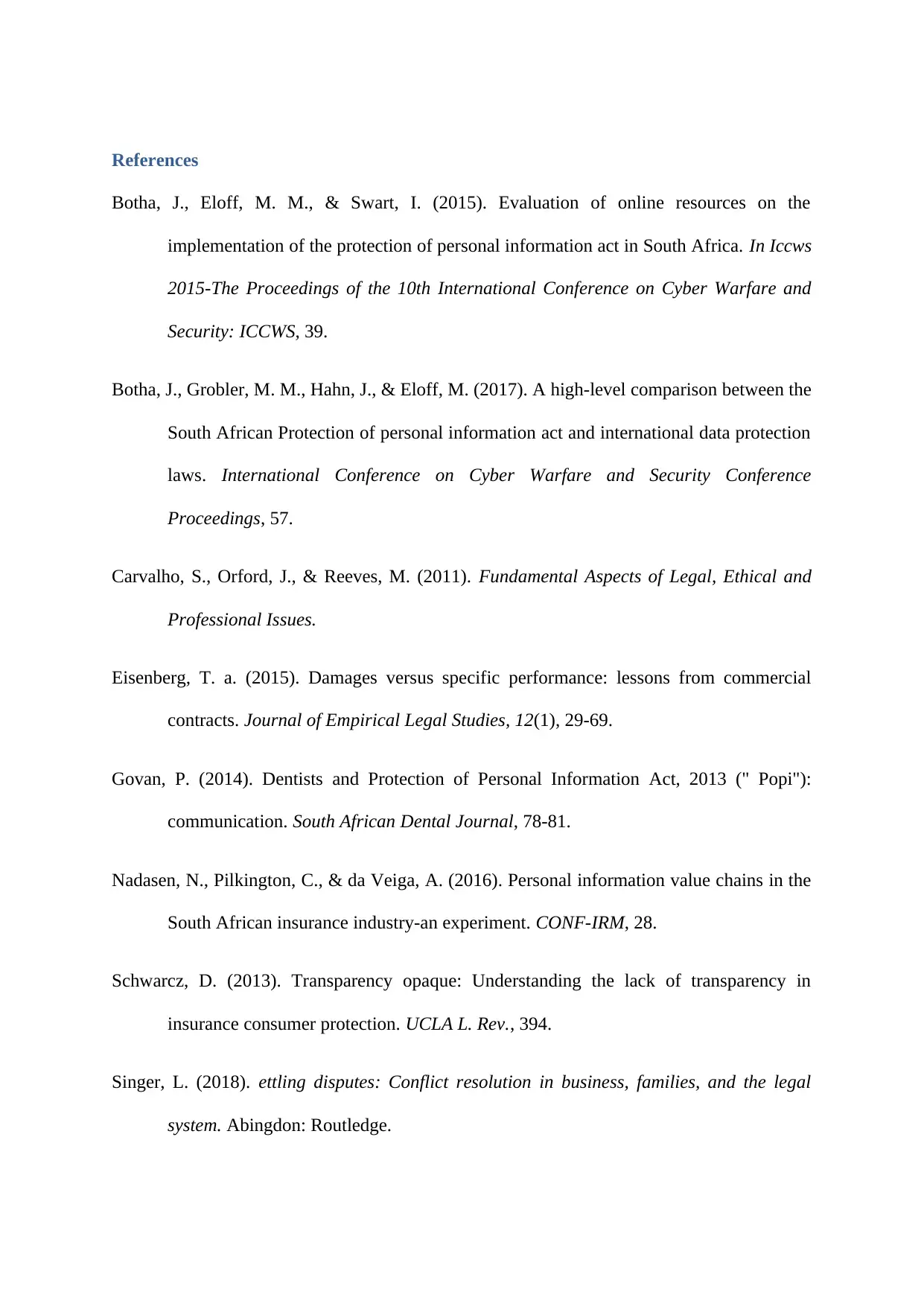
References
Botha, J., Eloff, M. M., & Swart, I. (2015). Evaluation of online resources on the
implementation of the protection of personal information act in South Africa. In Iccws
2015-The Proceedings of the 10th International Conference on Cyber Warfare and
Security: ICCWS, 39.
Botha, J., Grobler, M. M., Hahn, J., & Eloff, M. (2017). A high-level comparison between the
South African Protection of personal information act and international data protection
laws. International Conference on Cyber Warfare and Security Conference
Proceedings, 57.
Carvalho, S., Orford, J., & Reeves, M. (2011). Fundamental Aspects of Legal, Ethical and
Professional Issues.
Eisenberg, T. a. (2015). Damages versus specific performance: lessons from commercial
contracts. Journal of Empirical Legal Studies, 12(1), 29-69.
Govan, P. (2014). Dentists and Protection of Personal Information Act, 2013 (" Popi"):
communication. South African Dental Journal, 78-81.
Nadasen, N., Pilkington, C., & da Veiga, A. (2016). Personal information value chains in the
South African insurance industry-an experiment. CONF-IRM, 28.
Schwarcz, D. (2013). Transparency opaque: Understanding the lack of transparency in
insurance consumer protection. UCLA L. Rev., 394.
Singer, L. (2018). ettling disputes: Conflict resolution in business, families, and the legal
system. Abingdon: Routledge.
Botha, J., Eloff, M. M., & Swart, I. (2015). Evaluation of online resources on the
implementation of the protection of personal information act in South Africa. In Iccws
2015-The Proceedings of the 10th International Conference on Cyber Warfare and
Security: ICCWS, 39.
Botha, J., Grobler, M. M., Hahn, J., & Eloff, M. (2017). A high-level comparison between the
South African Protection of personal information act and international data protection
laws. International Conference on Cyber Warfare and Security Conference
Proceedings, 57.
Carvalho, S., Orford, J., & Reeves, M. (2011). Fundamental Aspects of Legal, Ethical and
Professional Issues.
Eisenberg, T. a. (2015). Damages versus specific performance: lessons from commercial
contracts. Journal of Empirical Legal Studies, 12(1), 29-69.
Govan, P. (2014). Dentists and Protection of Personal Information Act, 2013 (" Popi"):
communication. South African Dental Journal, 78-81.
Nadasen, N., Pilkington, C., & da Veiga, A. (2016). Personal information value chains in the
South African insurance industry-an experiment. CONF-IRM, 28.
Schwarcz, D. (2013). Transparency opaque: Understanding the lack of transparency in
insurance consumer protection. UCLA L. Rev., 394.
Singer, L. (2018). ettling disputes: Conflict resolution in business, families, and the legal
system. Abingdon: Routledge.
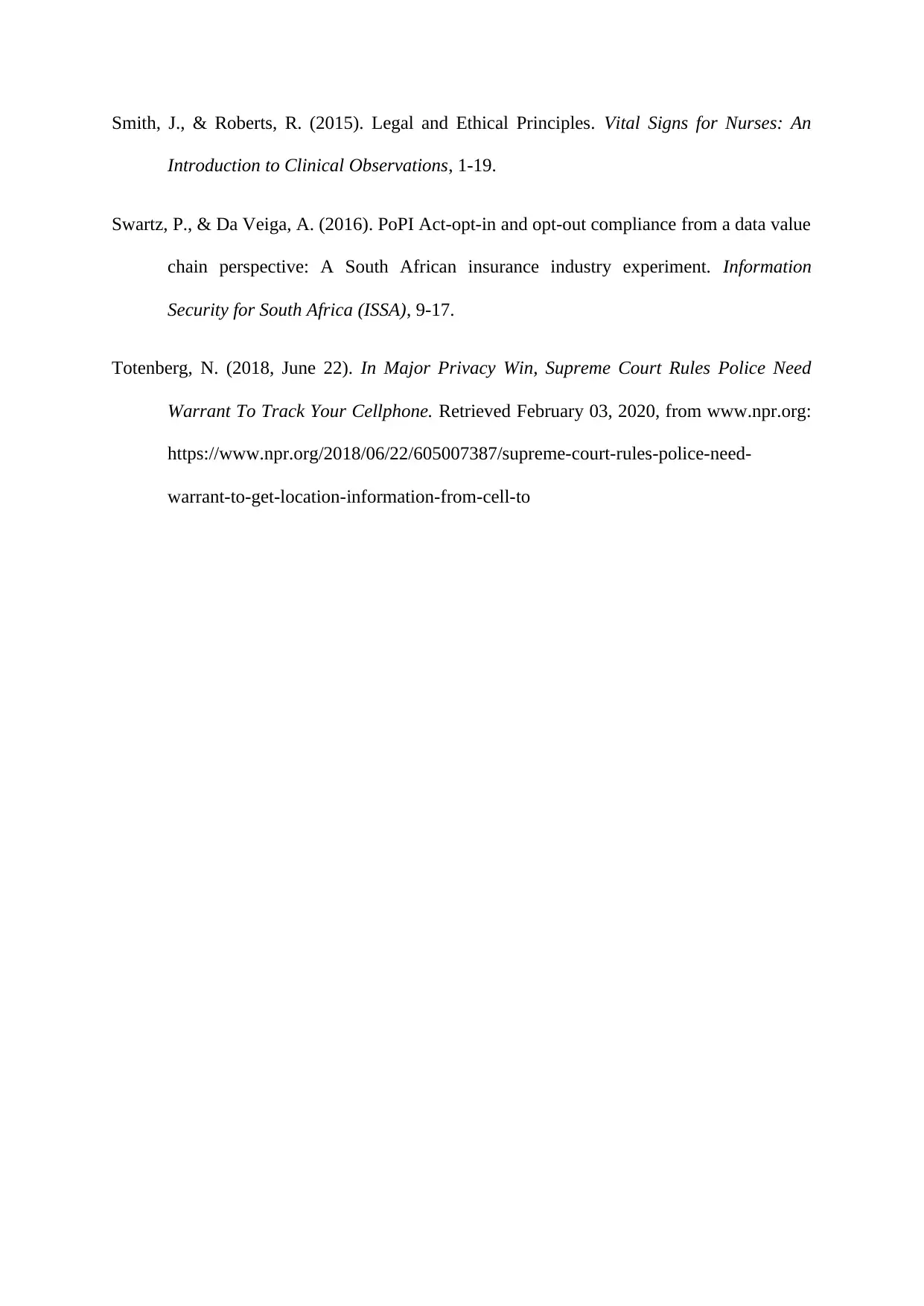
Smith, J., & Roberts, R. (2015). Legal and Ethical Principles. Vital Signs for Nurses: An
Introduction to Clinical Observations, 1-19.
Swartz, P., & Da Veiga, A. (2016). PoPI Act-opt-in and opt-out compliance from a data value
chain perspective: A South African insurance industry experiment. Information
Security for South Africa (ISSA), 9-17.
Totenberg, N. (2018, June 22). In Major Privacy Win, Supreme Court Rules Police Need
Warrant To Track Your Cellphone. Retrieved February 03, 2020, from www.npr.org:
https://www.npr.org/2018/06/22/605007387/supreme-court-rules-police-need-
warrant-to-get-location-information-from-cell-to
Introduction to Clinical Observations, 1-19.
Swartz, P., & Da Veiga, A. (2016). PoPI Act-opt-in and opt-out compliance from a data value
chain perspective: A South African insurance industry experiment. Information
Security for South Africa (ISSA), 9-17.
Totenberg, N. (2018, June 22). In Major Privacy Win, Supreme Court Rules Police Need
Warrant To Track Your Cellphone. Retrieved February 03, 2020, from www.npr.org:
https://www.npr.org/2018/06/22/605007387/supreme-court-rules-police-need-
warrant-to-get-location-information-from-cell-to
⊘ This is a preview!⊘
Do you want full access?
Subscribe today to unlock all pages.

Trusted by 1+ million students worldwide
1 out of 12
Related Documents
Your All-in-One AI-Powered Toolkit for Academic Success.
+13062052269
info@desklib.com
Available 24*7 on WhatsApp / Email
![[object Object]](/_next/static/media/star-bottom.7253800d.svg)
Unlock your academic potential
Copyright © 2020–2026 A2Z Services. All Rights Reserved. Developed and managed by ZUCOL.





